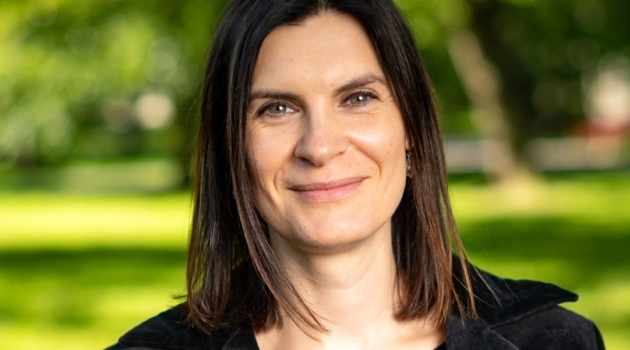Paulina Nowicka: Communication is key in dietary treatments
Researcher profile
Paulina Nowicka is a new Professor of Food Studies, Nutrition and Dietetics, especially Communication of Dietetics, at the Department of Food Studies, Nutrition and Dietetics. Her research focuses primarily on how to find treatments that work for children with obesity.
Paulina Nowicka is the first holder of the Professorial Chair in Communication of Dietetics. With the post comes overall responsibility for both research and doctoral education in the field.
“I hope I will be able to help young researchers along the way, but also to inspire more dieticians to start researching. There’s nothing more enjoyable than that.”
She began her academic career by studying psychology and subsequently made the leap to the Dietetics Programme.
“I come from a family involved in sports and have trained in athletics myself. My father is a coach and has worked with several Olympic medallists, so initially I wanted to become a sports psychologist,” she explains.
But when she was a volunteer during the world championship athletic competition in Gothenburg in 1995, she shared a room with the Polish athletic team’s dietitian in the athletes’ village.
“That is when it occurred to me that being a dietitian must be the world’s most interesting profession, and I applied for the Dietetics Programme.”
Her goal then was to work with elite athletes, which she was close to doing when she received an offer to take a doctorate with the Norwegian School of Sport Sciences.
“But at the same time, I had received an inquiry about doing a doctorate in childhood obesity. It was a difficult decision, but then somehow it dawned on me that everything I learned in sports psychology and nutrition can just as well be used for children with obesity as for elite athletes.”
It is largely a matter of communication, Nowicka believes. How you convey dietary advice and how you use nutrition to get results.
“This professorship is about how we communicate dietary treatments and dietary advice to different target groups. Within my area of expertise, childhood obesity, we wrestle with the fact that patients often discontinue treatment.”
This is often due to a failure in communication in combination with unreasonable expectations.
“When the patients arrive, they often want to have a structured treatment that shows in detail what they should eat. The only problem is that it is almost impossible to live the rest of one’s life based on such a regimen.”
Her research has dealt primarily with finding treatments for children with obesity that work and determining what it is that makes them work.
“I did my placement for the Dietetics Programme at a children’s hospital in Malmö, and thanks to paediatrician Carl-Erik Flodmark, I became aware of how complex the field is and how little we know about it. That was now 20 years ago, but my fascination remains, and I am still just as humble in the face of the challenge.”
Nowicka has been active clinically for almost 10 years and has met thousands of children and their parents.
“These meetings have shaped and coloured my research questions. During the evenings and weekends when working with my research, I have considered the patient group and how it deserves a treatment that works.”
She has participated in designing various types of treatments for children of different ages and in recent years has worked at Karolinska Institutet. A key factor in achieving results was allowing parents of children with obesity to meet other parents in the same situation and talk freely about the difficulties they encounter.
“It is important to apply a guilt-free way of communication and be responsive to the challenges that the families face.”
It is also about giving personalised advice based on the patient’s situation, with small incremental changes rather than an overly strict dietary programme so that the patient grows into the challenge.
Her dream is to improve health communication and develop the research field within communication of dietetics.
“Some others internationally are doing research on this, but there are very few of us. We have a lot of work ahead of us in terms of reducing the stigmatising of the patient group, but also of strengthening the profession of dietitian and helping those who work on childhood obesity to get through to patients.”
She believes that many are stuck in an old mindset where the focus is what an optimum composition of diet looks like rather than how we can change our lifestyle patterns in a sustainable way.
“Imagine if we could create a treatment that people want to continue and feel psyched about and strengthened by. That’s something I would really like to achieve.”
Josefin Svensson
Facts
Currently: Serving as Professor of Food Studies, Nutrition and Dietetics, especially Communication of Dietetics, at the Department of Food Studies, Nutrition and Dietetics.
Career in brief: Earned her doctorate at Lund University in 2009. Postdoctoral research (2009–2014) at Yale University, University of Oregon and University of Oxford. Has been associated with Karolinska Institutet since 2010.
Hobbies: It is perhaps more of an involuntary interest, but I am chair of my housing cooperative. I have learned a lot about what it is like to live in a block of flats, so now it is actually kind of fun.
Most recently read book:Snacka Snyggt (“Talk Nicely”), by Elaine Eksvärd. Inspiring. As a university lecturer, it is good to be reminded of the importance of rhetoric, and I hope to incorporate some of these tips during my inaugural lecture.
Makes me happy: To see my colleagues develop.
Makes me angry: Administration, and especially administrative frameworks connected with EU grants. It takes far too much time from the research itself.
Hidden talent: I have a good sense of direction. I often find my way and arrive on time.

